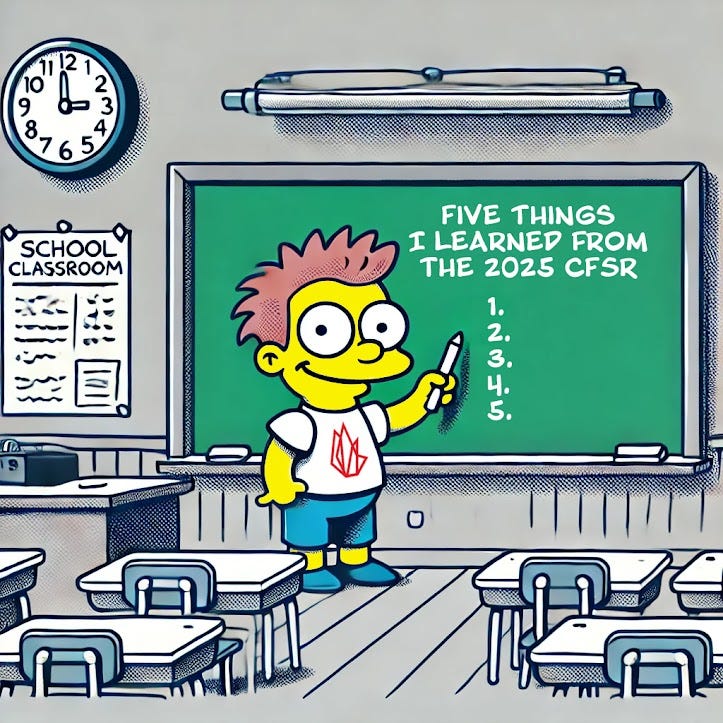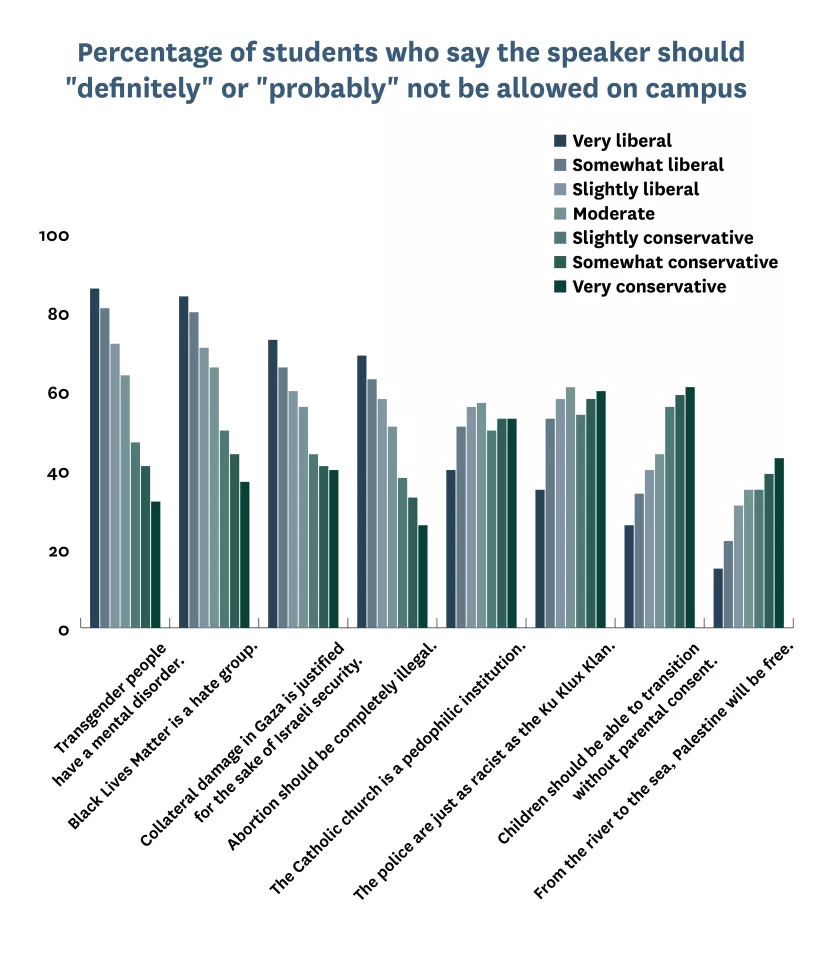Five quick takeaways from FIRE’s 2025 College Free Speech Rankings
What stood out to me in the first day of the new rankings
For the fifth consecutive year, FIRE has delivered its annual College Free Speech Rankings. This year, we paired the largest survey of college student attitudes on free expression ever conducted (almost 59,000 students surveyed!) with the most comprehensive databases ever collected of deplatforming attempts, professor cancellation attempts, student cancellation attempts (full database forthcoming, but the incidents used in the rankings calculation are on our website), and speech codes ever collected.
This is, by far, the most ambitious attempt to measure and rank college speech climates ever attempted, let alone completed. And it could not have been completed without FIRE’s outstanding research team, especially our Chief Research Advisor, Sean Stevens.
The full report is well worth reading. But to prime you for it, here are five key takeaways that show how colleges have moved around, explore why that might be, and highlight what students need to work on most. (Note: We’re working on individual school reports for many of these schools; we’ve linked the ones that are finished so far.)
1) The University of Virginia tops the list for the first time, and what the five top schools have in common.
2. Michigan Technological University
3. Florida State University
4. Eastern Kentucky University
5. Georgia Institute of Technology
The first and easiest thing to notice about these results is the contrast between State Universities and the Ivies. All five of our top schools are State Universities, and their average score is a little over 71. The highest-ranked Ivy school, Yale, comes in at 155 — the only Ivy in the top 200 — with a score just a hair over 44. (Let’s not calculate the average ranking of Ivy League schools, which is going to be brought down quite a bit since Harvard and Columbia’s scores were in the negatives and had to be rounded up to zero.)
2) Harvard is dead last, and what the five bottom schools have in common.
247. Barnard College
248. University of Pennsylvania
249. New York University
250. Columbia University
251. Harvard University
As the report explains:
All of the bottom five schools experienced a number of controversies involving the suppression of free expression. They also received significantly lower scores than the top five schools on “Administrative Support,” “Comfort Expressing Ideas,” and “Tolerance Difference,” which measures the strength of students’ favoritism when it comes to allowing liberal or conservative speakers on campus.
3) Students are too intolerant of speakers they don’t like.
In our survey, we ask students whether eight hypothetical speakers with controversial ideas should be allowed to speak on campus. The possible responses are that the speakers should definitely be allowed, probably be allowed, probably not be allowed, or definitely not be allowed.
How did the students do? Not well. From the report:
Overall, a majority of students said that six of the eight speakers should “definitely” or “probably” not be allowed on campus. Roughly two-thirds of students opposed the speaker who said “Transgender people have a mental disorder” (68%), and the same percentage opposed the speaker who said “Black Lives Matter is a hate group.” At least half opposed the speakers who said the following:
“The Catholic church is a pedophilic institution” (51%).
“The police are just as racist as the Ku Klux Klan” (53%).
“Collateral damage in Gaza is justified for the sake of Israeli security” (59%).
In contrast, 71% of students said that a speaker who said “From the river to the sea, Palestine will be free” should “definitely” or “probably” be allowed on campus, and 56% said the same about a speaker who said “Children should be able to transition without parental consent.”
Similar to the student responses on the different forms of disruptive conduct, student opposition to controversial speakers often correlated with political identity.
While there are many reasons why students should be willing to tolerate speech they don’t like, one that students ought to consider is that if we make it socially acceptable to silence speakers, that power will be wielded by the powerful and ultimately used to suppress student speech. Nobody stays in power forever, so remember that whatever authority you grant yourself, you’re also granting for the next guy.
4) The University of Chicago slipped this year, but there’s reason to think it’ll bounce back.
The University of Chicago was the #1 school in our first rankings, was second place the next year, and took the top spot again in our third year. Then, last year, it came in at number 13.
This year, it comes in at #43. As the report explains:
This decline is primarily due to two incidents that occurred after Hamas’ October 7, 2023, attack on Israel. In one instance, medical students attempted to disrupt a speaking event featuring the newly elected president of the American Medical Association. In the other, students successfully disrupted an organized protest of the Hamas attack that was supposed to feature multiple speakers.
In both of these incidents it was students, not the administration that suppressed speech. In fact, UChicago responded to both incidents in a pro-free speech way.
The attempted disruption failed because university security escorted the protesters out and the event resumed. UChicago still lost some points because the attempted disruption indicates a campus environment where students think it is acceptable to pursue a “heckler’s veto.”
The successful disruption occurred last fall. The campus Chabad organized a group of students for a protest of Hamas' attack on Israel on the university's central quad. The group officially requested and reserved the space for five hours. As the demonstration began Students for Justice in Palestine disrupted the event, preventing Rabbi Anna Levin-Rosen, Rabbi Yossi Brackman, and Hannah Auerbach of the Orthodox Union JLIC from delivering their remarks.
UChicago was penalized for this shoutdown, but the president’s response slightly mitigated this punishment:
[N]o member of our community may shout down or seek to prevent the protected expression of those with whom they disagree. You may not tear down a poster. You may not seek to intimidate or threaten another person, or prevent them from hearing an invited speaker. These are egregious offenses against our community.
In other words, while the school responded in speech-protective ways and made speech-positive statements, which mitigated the impact of the incidents, the fact of the disruption still impacted the school’s overall score to make its ranking just “slightly above average.”
Still, the rankings are best understood as snapshots in time, and looking at the overall performance of the University of Chicago over time, it should be viewed as a top-performing school, and one well worth considering attending. Hopefully, they’ll bounce back again next year and we can look back on their #43 as a fluke.
5) Some schools, like the University of South Carolina and Virginia Commonwealth University, have improved dramatically.
Last year, the University of South Carolina ranked 246 out of 248 schools, with what we described as a “Very Poor” rating. This year, it’s 34 out of 251. VCU managed to go from 184 to 32. As the report explains:
One reason for their overall improvement is that both schools improved their score on “Comfort Expressing Ideas.” VCU moved from a ranking of 150 to a ranking of 108, and it ranks 18 on “Self-Censorship,” suggesting an improved campus speech climate. The University of South Carolina improved its “Comfort Expressing Ideas” ranking from 160 last year to 100 this year. It also improved considerably on “Administrative Support,” ranking 142 last year and 72 this year.
Another reason for these schools' improvement: Both schools worked directly with FIRE on revisions to their policies to earn a “green light” rating. The University of South Carolina adopted the “Chicago Statement” in June 2023 and revised four policies. VCU revised six.
What the University of South Carolina and VCU show is that the institutional will to change matters. USC’s score went up by 45 points, 15 of which were due to their policy changes. That means that two-thirds of their score increase are a direct result of the improved climate for free speech on their campus.
This is good news. There are schools that didn’t have great showings this year but have exhibited signs they have the will to improve in future years, which would be worth watching. Three that come to mind: Dartmouth, Vanderbilt, and Stanford. Keep an eye out for them in the next few rankings.
Of course, for some schools, all they had to do to improve was less. Claremont McKenna is back in the top 10 this year, landing at number six. It had been the top school in our second rankings, was sixth the year after, but had fallen to 73 last year. That dip was a reflection of three incidents from 2021 and 2022 where the school sanctioned multiple faculty members, each for quoting a racial slur in literature. Those penalties decay over time, however, and Claremont McKenna hasn’t shown up in the Scholars Under Fire database since then.
I’m sure there will be more takeaways from this report, because we have a great deal of data yet to process. And if you’re a professor, a curious student, or a statistical gadfly who just enjoys the warm glow of a screen with R or Stata on it, all our data is available if you email data at thefire.org to request it.
A note from the ERI team: Due to a miscommunication, we published a piece this week by Sean Stevens before he was finished with it. Apologies to Sean.
Shot for the Road
I sat down with Rising’s Robby Soave and guest host Nomiki Konst yesterday to talk about how to fix free speech on campus:





I noticed that two of the top five are engineering schools. It's been years ago, but I spent my first two years at an engineering school, and my second two at a liberal arts school. HUGE difference.
In basic terms, at an engineering school there is one correct answer. You do a bunch of calculations to derive that one correct answer. In liberal arts school, there is little to no math and a whole lot of conjecturing. We are told that there are no wrong answers. In reality, there are LOTS of wrong answers.
With what I've said, one might think that engineers are more inclined to see one right answer, and then proclaim that anyone who disagrees is wrong. One might think that the liberal arts student, with the 'no wrong answer' mentality would be tolerant of any idea. But that's just not the case. I think people who make their living in the world of physical reality have a healthy respect for considering all possibilities. Failure to consider even one of a multitude of possibilities could get people killed. Engineers try to think of EVERYTHING.
Liberal arts majors have the luxury of being able to believe whatever they want, untested by reality. Still, I don't know why both the schools and the students can't be more tolerant of other ideas. I think it is that their ability for rational assessment is limited. To such schools, they desire an emotional attachment to an idea. That's how they relate to each other. Their ideas are more than that; they are beliefs. It seems that what they believe is less important than that they all believe the same thing, and thereby emotionally connect.
Awesome work, great summary!